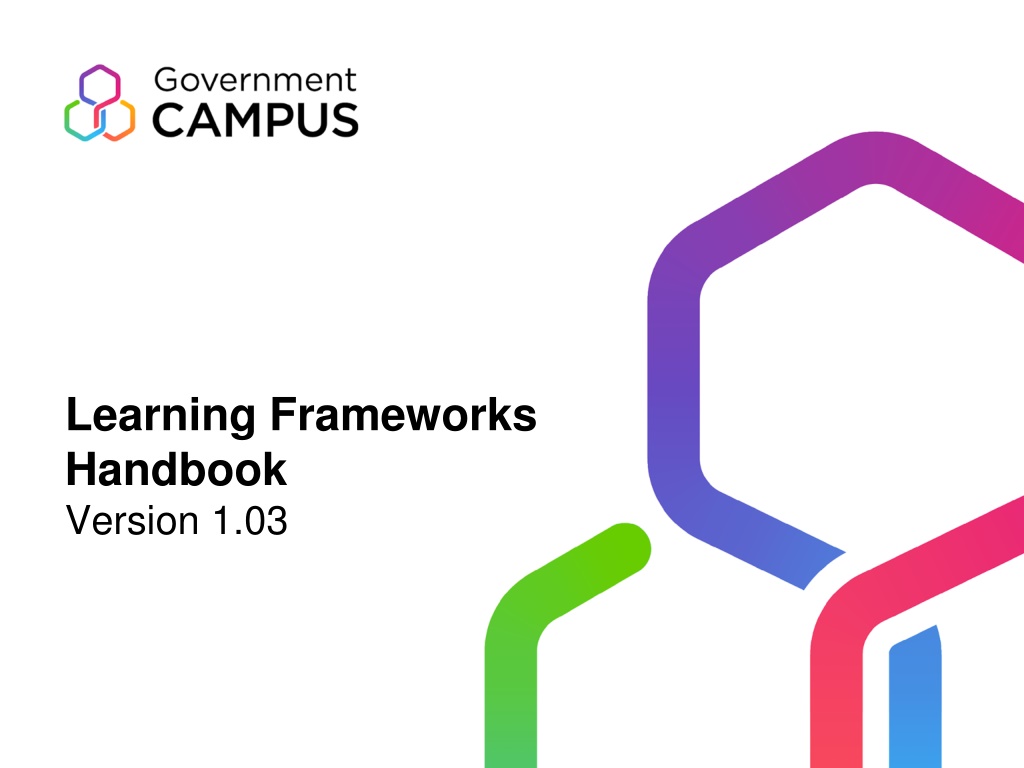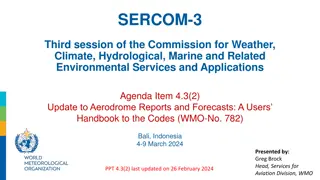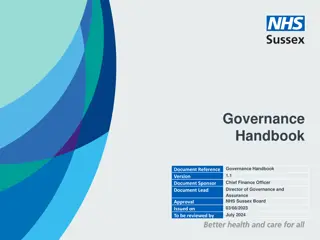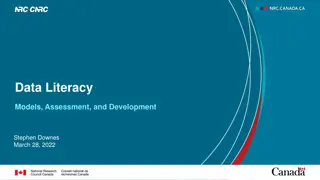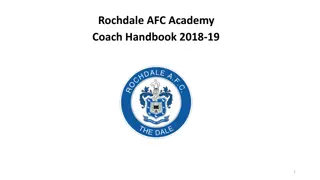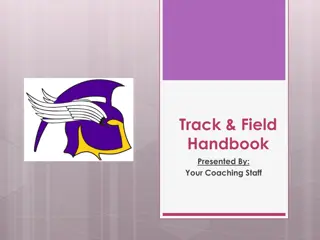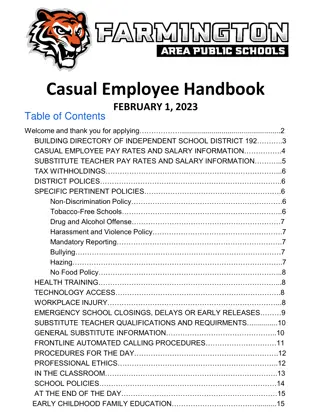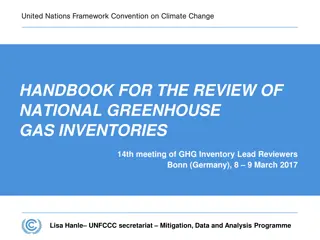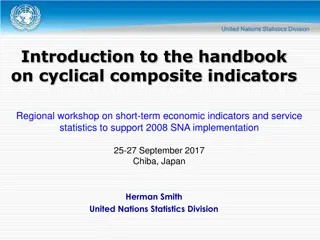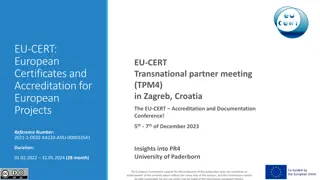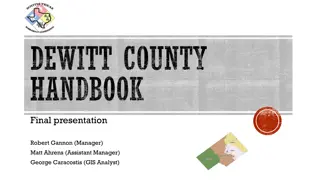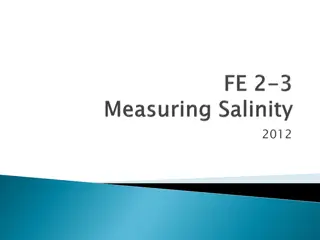Learning Frameworks Handbook
This comprehensive handbook provides an overview of the learning frameworks designed to enhance training and development within the Civil Service. It covers service benefits, governance, available resources, and valuable insights on maximizing the impact of learning frameworks. The handbook aims to aid both individuals and organizations in utilizing these frameworks effectively.
Download Presentation

Please find below an Image/Link to download the presentation.
The content on the website is provided AS IS for your information and personal use only. It may not be sold, licensed, or shared on other websites without obtaining consent from the author. Download presentation by click this link. If you encounter any issues during the download, it is possible that the publisher has removed the file from their server.
E N D
Presentation Transcript
Learning Frameworks Handbook Version 1.03
Overview and contents This handbook is to help you get the most from the learning frameworks. We welcome your feedback to improve future releases. Service overview the headlines Our learning service a detailed look at what the service offers Using the service how to get maximum impact from the learning frameworks Benefits of using the frameworks how the service benefits you and your organisation Governance and commerical key facts the mechanics of how the service is managed Useful resources Appendices Feedback on the handbook 2
The learning frameworks The Cross Civil Service curriculum: training products to meet the Civil Service s unique needs The Cabinet Office s Government Skills and Curriculum Unit (GSCU), acting on behalf of the Civil Service, manages a set of contracts for the delivery of learning and development across the Civil Service. These are called the learning frameworks. Coaching and subject matter expertise: access 120 coaches and a pool of subject matter leaders providing expert insight Off the shelf training: products that cover everything from IT training to qualifications The Helpdesk: single point of access for all services, making training accessible and delivering a great user experience The learning frameworks give departments, professions and functions access to a wide suite of training products delivered through two providers, KPMG and EY. It is a safe, approved route to market for quality training through specialist suppliers. Bespoke learning and design delivery: services for a specific department, function or profession The learning frameworks are part of the Government Campus. 4
Why use the central contracts? (1/2) Central contracts are managed by Crown Commercial Services and the Cabinet Office s GSCU. This means that risk and administration are taken away from you and follow government policy guidelines. Spend controls are managed centrally through the contracts. There are no additional barriers to procuring services. KPMG and EY have dynamic supply chains, consisting of reputable training providers ready to meet the demands of the Civil Service. Value for money underpins service delivery: 'Build once, use many times helps to reduce duplication in the delivery system. The ability to contextualise up to 25% of the Cross Civil Service curriculum products for closed bookings via a facilitator pre-briefing, tailored introductions and/or inclusion of case studies that meet the stated business and learner outcomes. Further contextualisation is possible with additional charge. Off the shelf (OTS) learning at a price which is comparable to that in the marketplace. The ability to contextualise OTS closed events. Examples include introductions and use of organisation-specific case studies where appropriate. However, this may be chargeable. 5
Why use the central contracts? (2/2) An end-to-end learning offer is provided including a streamlined booking service and accurate management information (MI). Robust governance makes sure that the service meets the needs of the Civil Service, with quality and consistency ensured through regular horizon scans and oversight of the central contracts. Departments, professions and functions have active roles in this governance process. Transparency of training initiatives and sharing training activities across the Civil Service. 6
The Cross Civil Service curriculum What is it? The Cross Civil Service curriculum encompasses a range of training specific to the Civil Service to build skills and capabilities across departments, professions or functions. The curriculum provides access to high-quality training in subjects ranging from customer service and finance to personal effectiveness, leadership and management. The Cross Civil Service Curriculum provides training to all civil servants, from administrative assistants (AAs) to senior civil servants (SCSs) to permanent secretaries, in the form of one comprehensive, accessible and inclusive curriculum. The curriculum deliver a consistent approach to leadership throughout the Civil Service, from new managers to Permanent Secretaries. Who delivers the services? KPMG deliver the Cross Civil Service curriculum using a consortium of trusted, high quality, consortium partners, ensuring civil servants have access to the most innovative and up-to-date training. 8
Off the shelf (OTS) training What is it? The off the shelf; (OTS) curriculum provides access to a wide range of training products, qualifications, and accreditations. The training is from market-leading suppliers for use where no, or only minimal, contextualisation to the Civil Service is required. KPMG continuously reviews the curriculum and onboards suppliers to meet the needs of the Civil Service. Since the advent of the OTS catalogue, some products have been removed and some added. This is to ensure that the offer reflects learner demand both current and future together with the Civil Service focus overall. Through this contract, it is possible to offer better value for money and more varied options to address training requirements. The contract ensures that the available training is of high quality. By procuring centrally, you get access to management information to inform your capability plans and training needs. Departments, professions and functions can access a wide range of training for personal and professional development. Products range from 20-minute digital learning to accredited qualifications. Example course include Microsoft packages, cyber security, project delivery qualifications, cloud computing and data visualisation. Who delivers these services? The KPMG supplier network will provide civil servants with easy access to generic, innovative and up-to- date training. The supplier community is dynamic, and it continues to evolve by engaging with departments, professions and functions to be responsive to future skills needs. 9
Bespoke learning design and delivery what is it? What is it? This refers to learning solutions and training that is specific to department, function or profession training needs across the learning life-cycle. See the table below a guide to these services. Strategy Design Development Delivery Evaluation Support development of department, profession or function learning strategy Design of bespoke learning solutions Development of learning content Delivery of learning interventions Evaluation of impact of learning interventions Learning maturity model Learning needs analysis / root cause analysis Curriculum review Learning strategy Capability review / assessment / strategy / research Future capability research / insights Learning operating model design / function transformation Pathway to accreditation and licence to practice Capability transformation Learning / leadership culture assessment / strategy Transformation roadmap / change strategy Solution design Learner personas Learner journeys Curriculum design Course design Assessment tool design / adaptation Review of existing learning Capability / org design Learning operating model (LOM) design Design of capability tools (for example, success profiles, assessment tools, standards, career paths) Programme planning / management Authoring and instructional design Content development Digital asset development Course and programme development Capability tools development Change management Course delivery Facilitation Assessment centres Capability to support transformation programmes Embedding learning Learning activation Learning culture interventions Learning effectiveness review Design of direct and indirect learning measures Return on Investment (ROI) analysis Learning review and recommendations 10
Bespoke learning design and delivery who delivers these services? Who will deliver these services? EY leads a community of world-class academic and accreditation institutions alongside innovative learning providers who collaborate to meet learning needs. Clients will often experience the services of multiple community members to fulfil their requirements. Membership of EY s community is constantly growing in response to learning needs. 11
Bespoke learning design and delivery further details Further details Illustrative examples of bespoke learning design and delivery projects include: leadership and culture training required to support a department-specific transformation programme specialist, tailored research and insight support for a newly established or developing profession virtual digital learning co-developed with specialist content providers to support specific non-core training courses. 12
Coaching What is it? The EY community of over 150 coaches is accessed via a consumer-grade platform that aligns personal and organisational objectives (and budgets) to support the coach matching process. The coaching relationship is managed through the platform, enabling macro-analysis of key themes to inform the development of longer-term leadership learning strategy, contributing to organisational capability growth. Executive Coaching Team Coaching Over 150 experienced executive coaches to meet all needs and budgets. Clear packages of coaching supported by cutting-edge technology. Specialist coaches who can get the best out of teams and help them navigate through a range of different challenges. Executive Coaching Who will deliver these services? EY leads a community of coaches (many of whom are recognised by the Civil Service) and maintains relationships with a list of globally renowned speakers, subject matter experts and facilitators to suit specific requirements. Further details Once a coaching package has been agreed, individuals access the platform and are matched to several suitable coaches at the appropriate level of experience and budget. A chemistry call then enables the individual to select their coach. The platform fully supports interaction between the learner and the coach. For example, users can book sessions, agree goals and objectives, record notes and request feedback. 13
Subject matter expertise (1/2) EY manages a cadre of subject matter experts who can deliver the following services. Facilitators Project-Specific Learning Experts Facilitators are experienced generalist and specialist trainers who support the delivery of pre-designed, Crown IP learning events or department, profession or function events providing extra trainer capacity. The offer includes a range of facilitation, from general to specialist. All have strong facilitation skills and an understanding of the public sector context. 'Generalist facilitators do not have topic-specific knowledge. For example, they may deliver internally- designed skills workshops or leadership development sessions. Specialist facilitators have subject-specific knowledge and may, for example, facilitate board workshops or deliver workshops on topics such as crisis management. EY also support with the coordination of facilitator scheduling and delivery. Project-specific learning experts are individuals who have a specialist skill set that can be used to support departments, professions and functions on learning projects and programmes. The offer includes the sourcing, onboarding and provision of learning SMEs. Examples may include individual SMEs to support on the development of training products relating to a specific technology implementation project, or a one-off training delivery requirement such as media training. To note project-specific learning expert requirements will be considered on a case-by-case basis, and an initial discussion will be held to agree if sourcing is possible. 14
Subject matter expertise (2/2) Further details If you would like to access our facilitator pool to find a project-specific learning expert to support you, you can submit a request by completing a new requirements form and we ll be in touch to discuss your needs. Depending on the nature and scale of the requirement, a facilitation request may also need a project management wrapper in addition to the published facilitation packages. This will be discussed with you during scoping conversations with the EY team upon receipt of your request. 15
Breadth of our partners (1/2) Cross Civil Service curriculum and OTS training A dynamic consortium of 100-plus suppliers covering professional services, business schools, universities, professional bodies and small/medium-sized enterprises that include: world-leading business schools, thought leadership and profession specialists market-leading brands in areas such as the following: leadership and management; diversity, equality and inclusion; data and analytics; and executive education reference libraries with extensive learning collections, some specific to subject areas and others supporting the development of a range of skills suppliers that enhance regional presence and delivery capability technology and innovation experts with capability to enhance the learner experience and plan for the workforce of the future. Bespoke learning A collaborative community of 40-plus market-leading and award-winning organisations, all aligned to the common purpose of improving citizen outcomes through exceptional training. The community includes: globally renowned universities, colleges and training providers developers of digital content and virtual courses subject matter experts with deep technical knowledge in specialist topics leadership, culture and change specialists international accreditation institutions. 16
Breadth of our partners (2/2) Coaching and subject matter experts A dynamic community of over 150 coaches and subject matter experts providing specialist training and facilitation, all with a focus on aligning the fulfilment of personal goals with organisational objectives to deliver systemic improvement and return on investment. The community is dynamic and flexible to the evolving and individual needs of users and buyers, and is committed to being part of a wider community that shares best practice, experience and the latest developments within the Civil Service and wider public sector. 17
The Helpdesk What is the Helpdesk? The Helpdesk, delivered by KPMG, has oversight of all training commissioned through the learning frameworks and can support customers to resolve their issue or enquiry in a straightforward way as quickly as possible. The Helpdesk makes training more accessible; this results in a better learner and customer experience. The Helpdesk will: respond to customer enquiries about the service and how to use it book or access the training required or signpost learners to other relevant training available through the learning frameworks. The booking process is described here (the lead-in times for standard bookings is 6 weeks from the date of delivery, and the lead-in time for new requirements is 8 weeks from the requested date of delivery) progress training requirements to the correct learning provider (KPMG or EY, or a combination of both) so that the needs of departments, functions and professions are best met report on spend controls across the learning frameworks provide a single integrated source of training MI across all providers, covering bookings, attendance, evaluations and other key information maintain and continuously improve the overall learning frameworks customer and learner experience. Contact details support@governmentcampus.co.uk, tel: 0203 640 7985. Opening times: Monday to Friday, 8:30am 5:30pm UK time, excluding English public holidays. The Helpdesk can receive emails 24/7. Hours are reviewed annually, taking into account any changes to demand outside of these agreed hours. Therefore, feedback on opening hours is welcome. 18
How do individuals access the offer? Individual learners can access Prospectus Online, a platform that hosts details of training courses currently available on the Cross Civil Service curriculum, as well as other off the shelf courses. Through Prospectus Online, you can browse the training on offer, plot your learning journey and discover other opportunities from across the organisation. To see how Prospectus Online works and how to make a booking, watch this short demo. You can now make closed and public bookings online using the new booking portal a quicker, smoother and more intuitive booking process with immediate access to up-to- date products and prices. 20
How do departments, professions and functions interact with the offer? As well as the Helpdesk and access to the Civil Service learning website, a dedicated account management team is on hand to support departments, professions and functions. Account managers work with, support and build relationships with commissioning departments, functions and professions. Customers can discuss with specialist provider account managers to understand how to get the best from each part of the learning frameworks service (please click here for details of how to access the list of KPMG and EY account managers). Customers and account managers collaborate with the Helpdesk. The Helpdesk helps to identify and confirms spend controls requirements so that the training request can be efficiently taken forward with the right provider. This is to make sure that all of the elements of the learning frameworks and Civil Service strategy have been considered for the right solution (including re- use of content where appropriate). Departments, functions and professions are invited to regular service meetings organised by the Helpdesk where they discuss learner experience and plans for the future. Relevant account managers attend these meetings and are available, as needed, between meetings. The Helpdesk works together with account managers, departments, functions and professions to: build a holistic view of training needs build strong relationships to understand specific learning objectives and/or wider context understand and be able to articulate the full learning frameworks offer provide learning insights and ideas. 21
Who is the service for? General principles The learning frameworks provide training to civil servants and officials paid by government organisations. The learning frameworks deliver training to civil servants and public sector representatives when the training is paid for in advance by an organisation with access to the Civil Service expert services. Members of the public or foreign nationals who are not employees of the British Government or devolved governments cannot access training through the learning frameworks. If you wish to commission training for an audience that does not match the above definition, you should liaise with your procurement team to find a suitable framework. If you have any queries, contact the Helpdesk. 22
Overview of enquiry management and complaints process (1/2) The Helpdesk supports customers by helping them identify the training they require or directing them to the appropriate contact to resolve their issue. Learners can raise an enquiry or complaint by contacting the Helpdesk as set out below. Email: support@governmentcampus.co.uk, tel: 0203 640 7985. Every query has a unique ticket reference number which enables the Helpdesk to track the query s progress and provide updates. If the Helpdesk cannot answer a customer's specific query, they will route the customer to the KPMG and EY service desks. The Civil Service learning website service desk will provide second-line support for technical enquiries related to the Civil Service Learning Website. The Helpdesk aims to respond to enquiries within five working days of receipt. Standard bookings have a six-week lead time from the requested date of delivery. New requirements have an eight-week lead time from the requested date of delivery. Where the customer is dissatisfied with any part of the training offer or service received and wishes to make a complaint, they should contact the Helpdesk to review with the relevant stakeholders. The Helpdesk takes all complaints seriously. To assist with the speedy resolution of complaints, it would be helpful if you could identify which action you require to enhance service delivery. 23
Overview of enquiry management and complaints process (2/2) Escalated complaints process (ECP) An established ECP is in place for the Cabinet Office, KPMG and EY to manage escalated complaints. An escalated complaint is an expression of dissatisfaction, in writing or verbally, about the investigation and/or response to a complaint previously raised by a department or a learner. The ECP is set out below. KPMG or EY will investigate and respond to the initial complaint. The complainant responds to KPMG or EY stating they are dissatisfied with the investigation or response. KPMG or EY class this response as an escalated complaint . The KPMG or EY service desk raises the escalated complaint to the KPMG or EY learning delivery team. The KPMG or EY Service Delivery Director raises an escalated complaint to the Cabinet Office within five working days of receipt. This will include: the complainant s details a summary of the complaint a summary of actions taken so far and timescales, with attachments where appropriate. The Cabinet Office will complete an independent and full review of the case from beginning to end. 24
Payment and invoicing process (1/2) Each department, profession and function agrees on a statement of requirements on their specific payment and invoicing requirements with KPMG and EY. Cross Civil Service curriculum and OTS learning (KPMG) KPMG has agreed to preferred billing arrangements and invoicing processes with departments. The supplier will confirm and schedule the event when payment is confirmed. Invoices are sent the day after an event. Payment is due immediately. Reminders are sent after 30 calendar days for non-receipt of payments. A monthly statement of overdue invoices goes out to the relevant contacts in HR and Finance, or more regularly for high volumes. Bespoke learning (EY) At the start of each bespoke learning engagement, a payment profile is agreed upon with the buyer and captured within a work order. A payment profile usually includes dates linked to deliverables or project milestones, the payment method and the purchase order number. On reaching the payment date, EY will confirm with the buyer in writing that a milestone or deliverable has been met, before issuing an invoice. 25
Payment and invoicing process (2/2) Coaching (EY) At the start of each coaching engagement, a work order will be issued. The work order will include the number of sessions and time for completion and will be issued upon completion of the booking form. Following the signing of the work order, coachees will have 6 weeks to match with a coach. Cancellation fees apply, as outlined on slide 28, should matching not occur within this period for individual bookings. Reallocation fees apply, as outlined on slide 29, for bulk coaching bookings. As soon as matching has commenced (i.e. a coach has been chosen), EY will issue an invoice for the full value of the coaching services. Subject Matter Experts (EY) At the start of each subject matter expert engagement, a payment profile is agreed upon with the buyer and captured within a work order . The work order will include the number of sessions and time for completion and will be issued once agreement has been reached on the scope. The payment profile includes dates for payment linked to sessions or delivery milestones such as completion of the delivery of workshops. EY will confirm in writing that a delivery milestone has been met before issuing an invoice. Queries about invoices There are dedicated email boxes for invoice-related queries. The response time will be 10 working days. For Cross Civil Service curriculum and OTS, email: KPMGinvoices.csl@kpmg.co.uk For bespoke and coaching/subject matter experts, email: ey.support.governmentcampus@uk.ey.com 26
Cancellations and amendments (1/4) If a customer requests to cancel or amend a booking (for example, swapping their place with a colleague on either a Cross Civil Service or off the shelf product) the following charges may apply. 16 working days or more before the commencement date: no charge. 11 15 working days before the commencement date: 30% charge of the total cost. Less than 11 working days before the commencement date: 100% charge of the total cost. If design work has been commissioned, costs incurred at the point of cancellation will be charged. Amendments are defined as any change to the event date, time, course or location. The cancellation request should be received by the Helpdesk by 4pm. If it is received after 4pm, the receipt of the request is classified as the following working day. The learning partner will give a minimum of 10 working days notice for cancellation (for example, due to low take-up). Reimbursements for travel or accommodation costs will not be provided at any point. Working days are classified as any day from Monday to Friday except for English public holidays. 27
Cancellations and amendments (2/4) If a customer requests to cancel or amend a booking for a bespoke designed programme being delivered via EY, the following charges may apply. 16 working days or more before the commencement date: no charge. 11 15 working days before the commencement date: 30% charge of the total cost. Less than 11 working days before the commencement date: 100% charge of the total cost. If design work has been commissioned, costs incurred at the point of cancellation will be charged. 28
Cancellations and amendments (3/4) For cancellations of project-specific SME and facilitation, the following charges may apply. 8 working days or more before the commencement date: no charge. 5 7 working days before the commencement date: 30% of the total cost. Under 5 working days before the commencement date: 100% of the total cost. If a buyer / booker / customer submits a request to amend a booking, this must be agreed directly between the client, SME/facilitator and EY in writing before the day of the session. If the booking change is agreed upon, your rates will then be chargeable against the amended booking. If the amendment is not agreed upon, and the session is cancelled, rates will be payable as per the terms above. Coaching sessions Any cancellations or changes to coaching session bookings shall be carried out in accordance with the cancellation and change policy below: If a cancellation is made within: Should matching (a coach has been selected) not occur within 6 weeks of the signature of the work order, the coaching package will be deemed to have been cancelled and you will be charged 15% of the value of the coaching package. 6 working days or more before the session commencement date, you will be able to reschedule; Under 5 working days before the session commencement date, the session will be lost. 29
Cancellations and amendments (4/4) Amending or repurposing purchased coaching (individual coaching bookings) If for any reason you wish to relinquish any sessions from a coaching engagement the following principle will apply: You will be able to re-assign unused sessions to a new coachee, providing the same coach is engaged The new coachee will be able to make use of any remaining sessions from that engagement You will need to re-assign any unused sessions (comprising unused engagements or partial engagements) to new coachee(s) within six months, or before the end of this work order s duration, whatever is soonest If you cannot re-assign sessions within the timeframe, the sessions are lost Amending or repurposing purchased coaching (bulk bookings) If for any reason you wish to relinquish any sessions from a bulk booking coaching engagement the following principle will apply: You will be able to re-assign unused sessions to a new coachee, providing the same coach is engaged The new coachee will be able to make use of any remaining sessions from that engagement You will need to re-assign any unused sessions (comprising unused engagements or partial engagements) to new coachee(s) within six months, or before the end of this work order s duration, whatever is soonest If you cannot re-assign sessions within the timeframe, the sessions are lost One reallocation is included for every 8 coachees on a bulk booking. Included under this work order are X reallocations. Any reallocations beyond this will charged at a rate of 325 + VAT per reallocation, contracted for via Change Order. 30
Civil Service L&D spend control (1/3) What are spend controls, and how will they be applied to learning? The purpose of the Cabinet Office learning and development (L&D) spend control is to encourage cross-government collaboration on training requirements. It will enable the Civil Service to benefit from the significant economies of scale associated with aggregated demand. It will also allow smarter L&D buying behaviours and reduce unnecessary spending. The Cabinet Office s Government Skills and Curriculum Unit (GSCU) manages central contracts with commercial learning and development experts who create and provide high-quality training to support and equip civil servants to deliver excellent public services. The central contracts provide organisations with the opportunity to benefit from prices that have been obtained through the Official Journal of the European Union (OJEU) tender process. This has demonstrated that significant savings can be achieved on the design and delivery of training services. In addition, commissioning organisations that use this route can benefit from resource savings by reducing the need to run a separate procurement. The L&D spend control will decide the best route to market for the requirement. Applicants must clearly define the training need so that the application is sent to the appropriate supplier. The L&D spend control will not decide if the training need is necessary, because authority and spending accountability rests with departments, professions and functions. The Cabinet Office will automatically assume that all requirements commissioned through the central L&D contracts have the respective local financial approval. The Helpdesk applies the L&D spend control via the new requirement process, outlined in the New Requirements Handbook. Further guidance is available on the following slides, and the official policy is here. 31
Civil Service L&D spend control (2/3) Does the L&D spend control apply to my organisation? The Cabinet Office determines to whom the spend control applies as part of its responsibility for the effective running of government. The Cabinet Office spend control policy states that all parent departments and its sponsored organisations that are classified as central government by the Office for National Statistics (ONS) are within the scope of the spend controls, and therefore, they are eligible to join the GSCU Expert Services. How do I make sure that my organisation complies with the L&D spend control? Please read the guidance. All training commissioned through the learning frameworks comes with automatic L&D spend control approval. If the service you need cannot be delivered by the learning frameworks, the Cabinet Office will typically give you approval to do a local procurement activity. Do all training needs require L&D spend control approval? Please read the guidance. 32
Civil Service L&D spend control (3/3) How can department commercial teams support the L&D spend controls? The learning frameworks service is designed to provide commissioners a service without the need for input from commercial or procurement teams. This is because the contract is managed centrally by the Cabinet Office, and the L&D spend control is embedded within the commissioning process, which provides value for money across the Civil Service. Consequently, you ll find that department commercial teams are not needed to input for the bulk of training requirements delivered through the learning frameworks. If, however, you receive L&D spend control authorisation to undertake local procurement (on the grounds that your requirement cannot be delivered through the learning frameworks), you will need to commission your commercial team to find a suitable commercial vehicle for your need. We need commercial advice. Who can we contact to answer questions regarding the learning frameworks contacts? Please discuss with your account manager in the first place. They can refer you to the relevant Cabinet Office commercial team. 33
What management information (MI) is available, and how can I access it? What can I get? Consistent, integrated MI is provided by the KPMG MI team each month. This covers all learning providers and training delivered through the service, including booking and attendance data and evaluation information from KPMG and EY (for example, learner evaluation scores). Where customers are unable to access the KPMG Power BI dashboards, MI datasets can be shared via an MS Teams SharePoint site. (Note that this solution does not contain the interactive graphical interface, summaries or breakdowns that are available via Power BI). Data will be available by the 10th working day of each month, at the latest. How do I get access to Power BI? Send the following details to ard.gss@cabinetoffice.gov.uk and they will instruct KPMG to set up your account. Your email will need to contain the following: a request to get access to learning frameworks MI data (specifying your department) consent to be bound by GSCU s privacy policy confirmation from someone at G7 or above in your line management chain that accessing the data fulfils a business need (you can either forward a chain or attach an email containing this confirmation). We manage data in line with our published privacy policy. Once you have received approval from the Cabinet Office, you will receive an invitation to view the Power BI MI dashboards from the KPMG MI team. 34
How can I check the status of my organisation s new requirements? Your organisation s new learning requests One of the benefits of the learning frameworks service is that we can pull together data from across our system and share this with the wider Civil Service. The Learning Frameworks New Requirement Transparency dashboard is an example of this. You can access the information in real time and track what requirements your organisation has submitted and how they are being progressed. How do I get access to the Learning Frameworks New Requirement Transparency dashboard? If you would like access to the Learning Frameworks New Requirement Transparency dashboard, please email support@governmentcampus.co.uk with the subject Learning Frameworks New Requirement Transparency dashboard access request , and include the people in your department who require access as well as whether or not they will need a demo. Access to this demo will only be given following authorisation by your organisation s single point of contact (SPOC). Any feedback regarding the dashboard should be sent to support@governmentcampus.co.uk 35
How do I keep up to date? At an operational level, the Civil Service single point of contact (SPOC) community meets regularly to discuss service delivery. Members of this community are selected by their organisation and act as the link between their respective Civil Service organisation, the Cabinet Office teams responsible for the website and the Campus and Curriculum Delivery teams. Through doing so, the SPOC develops their organisation s competence in using the learning frameworks and the website, and provides insight and feedback to help the Cabinet Office, KPMG and EY develop the overall service. GSCU run SPOC calls on a regular basis. These sessions provide an opportunity to consider whether there are topics or issues bubbling up that have not made it to the surface but which should be addressed as part of our continuous improvement plan. GSCU also run monthly fast fix forums . These are drop-in surgery sessions for fast problem- solving and knowledge sharing to better understand the learning frameworks offer. No prior booking is required. Simply follow this MS Teams link on the day of the session or alternatively dial in (tel: 020 3787 4277) and contact alastair.marsh@kpmg.co.uk to confirm the dial-in passcode. Our SPOCs receive a learning frameworks comms alert on a regular basis. The purpose of these emails is to provide the Civil Service L&D community with updates on the learning frameworks service. The learning frameworks 2.0 project team will keep SPOCs posted about the progress of the Learning Frameworks 2.0 project. This project will identify and procure the next iteration of the central training offer at the point when the existing contracts with KPMG and EY come to an end. The learning frameworks 2.0 comms alert is circulated to SPOCs on an ad-hoc basis. 36
What about languages training? For foreign language training, contact the Foreign, Commonwealth & Development Office (FCDO) Language Services Direct (LSD) at PAGtraining@languageservicesdirect.co.uk. FCDO s language contract has a Memorandum of Understanding (MoU). If you use FCDO's contract, you can get a MoU from marie-louise.childs@fcdo.gov.uk. 37
Benefits of using the frameworks
Benefits of using the frameworks (1/4) Risk and administration are taken away from departments, professions and functions The Cabinet Office manages the contracts centrally, leaving you free to commission the services you need without the additional complexities associated with contract management. When you buy through the learning frameworks, the service you get is endorsed at ministerial level and is compliant with the L&D spend control. The Civil Service s requirements are baked into the service The standard public sector contract terms and conditions are used to ensure your requirements are met. The contracts deliver value for money across their lifetime Over the whole contract, significant savings are made over a sustained period. GSCU review the contracts to make sure that they deliver value for money and respond to new government priorities. For example, in response to COVID-19, KPMG converted 90% of its products to virtual learning at no additional cost to the Civil Service. 39
Benefits of using the frameworks (2/4) Value for money and cost-saving efficiencies You get the following. Accurate quotes so you can manage your budgets better. Immediate access to training solutions; no need for additional procurement exercises. A system based on a build once, use many times approach that reduces duplication across the Civil Service system. Up to 25% free contextualisation of Cross Civil Service curriculum products (for example, facilitator pre- briefing, tailored introductions, organisation-specific case studies). Further contextualisation is possible with an additional charge. 'Off the shelf products are provided at market rates. 'Off the shelf products can be contextualised where appropriate, but may be chargeable at the relevant design rate (and may result in some Crown intellectual property (Crown IP). A simple way to commission training and monitor demand We deliver an end-to-end solution which includes a streamlined booking service and MI provision. Better quality data reduces duplication across the Civil Service by preventing departments from being charged for the design and delivery of similar products. Active quality assurance of the training offer The Frameworks s training offer is quality assured centrally, reducing cost across the Civil Service. It is more difficult to achieve this outcome through individual procurements because it would be necessary to consolidate evidence and data from multiple sources. 40
Benefits of using the frameworks (3/4) There is a mechanism to fund service improvements The Continuous Improvement Fund is used to update Cross Civil Service curriculum products which have Crown intellectual property. The fund can be used to develop new products to meet changing needs, delivered by KPMG, over the contract s duration. Decisions regarding the Continuous Improvement Fund are made by a pan-Civil Service governance authority. We use the fund to: improve the products where the intellectual property is owned by the Crown buy out the intellectual property of a product to provide a better value for money improve people s experience design new products to meet Cross Civil Service needs. Partnership working encourages investment Working in partnership with our suppliers (KPMG and EY) over a longer period encourages them to invest upfront to deliver mutual benefit. Such opportunities are not available if procuring individual training courses. Promoting social value through sustainable development The frameworks promote social value through sustainable development values. Using SMEs and local companies enriches communities and drives local development. Virtual learning reduces the need for travel, improving the carbon footprint of training. Digital products use less paper. 41
Benefits of using the frameworks (4/4) Accessibility and inclusion are integrated across the service Inclusion principles are followed and accessibility of the training is considered to provide the best possible learning for all. We work closely with the Cabinet Office Diversity and Inclusion (D&I) Strategy team, learning partners and networks to continue to improve the accessibility and inclusion of all training. All training design content seeks to incorporate and support D&I principles and behaviours including: valuing difference and building an inclusive culture to deliver improved business performance through increased employee engagement and better decision-making using the diversity in the team to introduce fresh thinking and innovation to improve business performance recognising the importance of individual differences, and using this to plan the right development for each member of the team recognising and overcoming personal barriers to managing and thinking inclusively knowing what the potential barriers are to building an inclusive culture, and taking action to overcome them recognising and challenging inappropriate behaviour such as bullying, harassment and discrimination. 42
Governance and commercial key facts
How is the service governed and how are the contracts managed? The learning frameworks governance is designed to ensure that the service meets the needs of the Civil Service. The Learning Frameworks Quality Board (LFQB) is responsible for strategic service delivery. It is chaired by the Cabinet Office s GSCU and comprises senior members of the Civil Service L&D community, KPMG and EY. The LFQB ensures that the learning provided through the contracts addresses the Civil Service s requirements, and it can commission new services. We rotate our members to make sure that we benefit from hearing different perspectives from across the Civil Service s L&D community. The Quality Standards Working Group is responsible for making sure that the Civil Service s Cross Civil Service curriculum is meeting our collective needs. The Cabinet Office manages the KPMG and EY contracts using the Service Level Agreements (SLAs). The Cabinet Office Commercial team leads this work. Click here for guidance on how to request copies of the learning frameworks SLAs. 44
The learning frameworks contract commercial details Headlines The Cabinet Office is the contracting authority for the contracts with EY and KMPG that provide the learning frameworks service. These contracts are call-off contracts from the Crown Commercial Service s (CCS) managed framework agreement RM6145: Learning and Development CCS (crowncommercial.gov.uk) Because the learning frameworks are a Crown Commercial Service (CCS) framework contract, departments who access it do not have to publish any details on Contract Finder. As the contracting authority, the Cabinet Office is responsible for managing the contracts on behalf of the Civil Service. Who is the Crown Commercial Service (CCS)? The CCS is an executive agency sponsored by the Cabinet Office. It operates as a trading fund under the Buying Agency Trading Fund Order 1991/875, which was made under the Government Trading Funds Act 1973. The CCS acts as a central purchasing body for the procurement and supply of goods and services to or on behalf of central government bodies and the wider public sector. The majority of these procurements fall within the scope of the Public Contracts Regulations (PCR) and are usually in the form of establishing framework agreements or dynamic purchasing systems. The CCS undertakes such procurements under the PCR, which is derived from EU Directive 2014/24/EU. The CCS also ensures procurements are conducted by following the Procurement Policy Notes (PPN), which are issued by the Cabinet Office. 45
What you get for your money Funding principles The cost of running the Helpdesk is covered by the cost of the learning provision. Pricing includes a percentage for continuous improvement to the Cross Civil Service offer. Pricing also includes the production of MI for GSCU and departments and evaluation evidence. Pricing covers the cost of the legal requirements of learning partners (for example, IT and data security, human rights). There is a Crown Commercial Service commissioning fee. Fares for facilitators travel are provided, in line with Civil Service travel policy. Contextualisation of Cross Civil Service curriculum learning (up to 25%) is included in the price. Suppliers won contracts based on quality and chargeable rate (per day / half day or hour). Factors that shape price Suppliers work with the Civil Service departments to provide value for money on a range of offers. Transparency reporting is undertaken to assess the fees against the agreed rates. Compliance costs with social responsibility and Modern Day Slavery Act obligations. Performance: Key Performance Indicators (KPIs) and Service Level Agreements (SLAs) are agreed and reported monthly. A target for the use pf Small and Medium-Sized Enterprises (SME), sourced locally wherever possible. Equal opportunities are ensured across all services. Delivery is in a COVID-19-safe environment with flexibility to change according to requirements. The contract is managed by the Cabinet Office Commercial team. 46
How does pricing work? The pricing mechanism that underpins delivery of the learning frameworks has been agreed upon by the Crown Commercial Service on behalf of the Civil Service. Given the current economic circumstances, there is pressure across the system to increase prices. The Cabinet Office is therefore working closely with suppliers to ensure that products needed by the Civil Service continue to provide value for money. The details are commercially sensitive; if you require additional information, please email contact.ccdt@cabinetoffice.gov.uk 47
What are the Service Level Agreements (SLAs)? Together with our learning partners, we have agreed a set of SLAs to help ensure departments, professions and functions receive the best possible level of customer service. Click here for guidance on how to request copies of the learning frameworks SLAs. We recognise some services do not have an associated SLA and, in these cases, the service level expectation is agreed upon elsewhere in the contract. It is important to acknowledge that there will be times when the learning partners ability to deliver the SLA relies upon the Civil Service: for example, where further information is needed from the customer or elsewhere in the Civil Service. In these circumstances, the clock will be stopped (ie. the turnaround time is paused) until the customer or Civil Service has provided the learning partner with the information they need. 48
How do the contracts comply with General Data Protection Regulation (GDPR)? The Civil Service is required by law to inform those who supply personal data to us on how we will use it. This is covered under our privacy notice: Civil Service Learning privacy notice. The third-party providers may separately collect personal data. Where that is the case, they will provide a privacy notice detailing which data is being collected and for what purpose. In the event of any personal data breaches, both GSCU and our suppliers are required to respond to the Information Commissioner s Office (ICO) within 72 hours, subject to the Cabinet Office s assessment. Regardless of whether data breaches are required to be reported to the ICO, the Cabinet Office maintains a register of all incidents. Anyone whose data we hold has the right to ask for us to disclose that information to them or delete the data. While we will not always agree to these requests, the Cabinet Office and our suppliers will respond to data subject requests within one month. 49
Why is intellectual property important? Intellectual property (IP) is an important consideration when commissioning the development of new learning and working out how to deliver optimum value for money. When you commission an existing course through the learning frameworks, you do not need to think about intellectual property. The Cabinet Office and the supplier will have worked through the issues before making the course available. When you commission a new piece of learning, you will need to consider intellectual property rights (IPR). As a default, our learning frameworks suppliers will ensure that all newly created training IP belongs to the Crown (known as Crown IP). However, the Commissioner can agree to use third- party IP if this would be more cost-effective. You will work with the supplier on the following. A clear distinction should be made in respect of intellectual property relevant to the services to be contracted, namely (i) existing IP and (ii) new IP that will be created and documented in the contract accordingly. Intellectual property rights can be bought/sold or transferred via a licence. The call-off provides for various licensing scenarios. Intellectual property rights and who owns them will usually be defined in any contracts you or your organisation lets to another third party. If you agree that the new intellectual property created will not belong to the Crown, you will adhere to the exceptions IPR process. The intellectual property position will be agreed upon and recorded as part of the sign-off process for all new products being created. There is an introduction to intellectual property (IP) in government if you want to know more. 50
